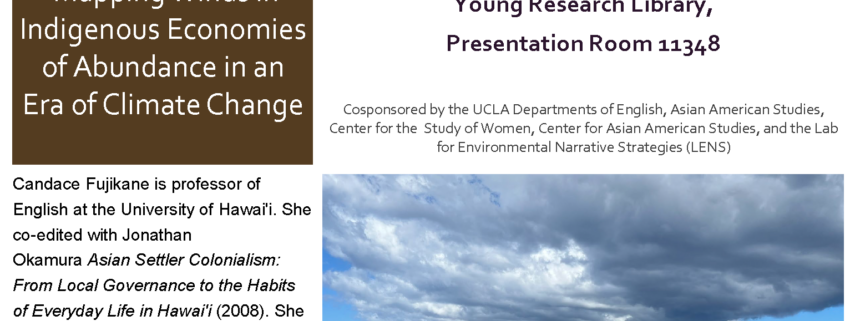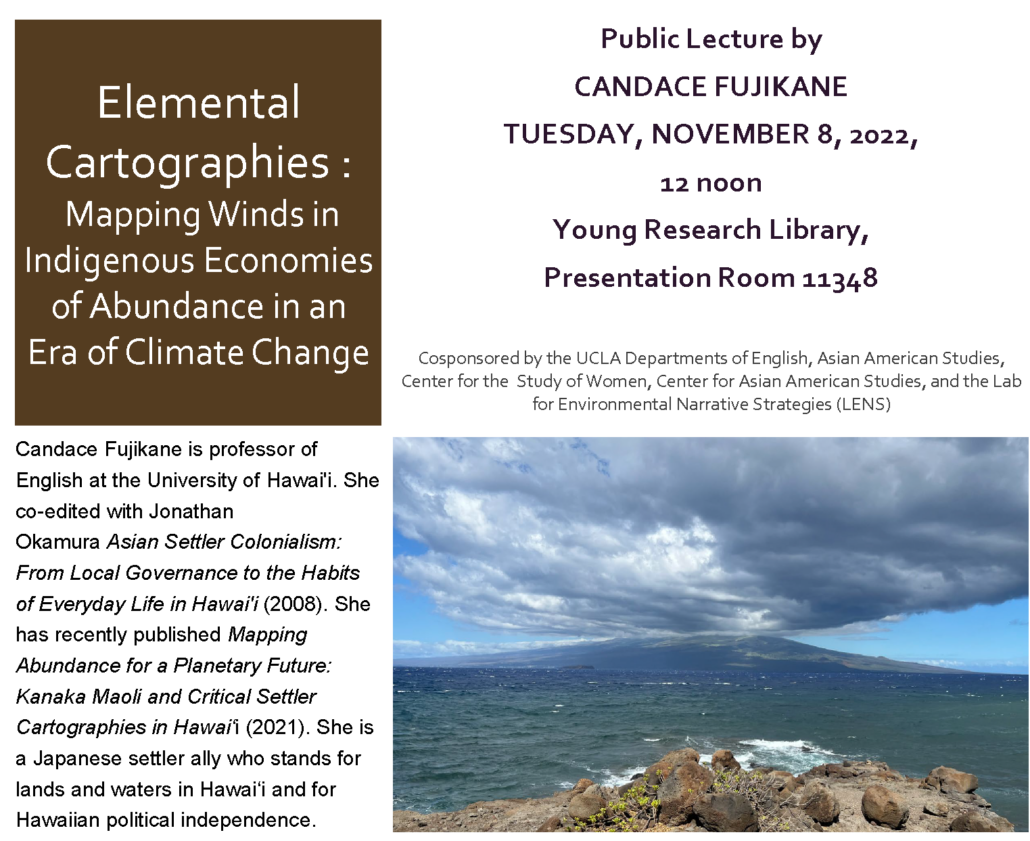
Organized by the Department of English and the Department of Gender Studies
Date: Tuesday, November 8, 2022
Time: 3:30-6:00 PM
Location: Charles E. Young Research Library Presentation Room 11348
As we bear witness to the wastelanding of the earth by late liberal capital, Kānaka Maoli are recovering ancestral knowledges encoded in oli (chants) and moʻolelo (storied history) to activate the elements and transform the effects of global climate change into possibilities for renewed abundance.
In this talk, Candace Fujikane begins with arguments from her recent book, Mapping Abundance for a Planetary Future: Kanaka Maoli and Critical Settler Cartographies in Hawaiʻi, contending that global climate change events are not apocalyptic but rather are bringing about the demise of capitalist economies of scarcity, making way for Indigenous economies of abundance. She will present a preview of her new book, Elemental Cartographies for a Changing Earth. Kanaka Maoli identify 400,000 akua or elemental forms and energies, including the 300 winds of the island of Kanaloa Kahoʻolawe. From 1941 to 1990, the US Navy used the island as a bombing target, with the devastating effect of cracking the water table. In the exhausted cartographies of militarized capital, only 9% of subsurface lands has been cleared of unexploded ordnance. The PKO practitioners, however, have long stood to protect the island, transforming the symbol of the target into a much more generative image of the piko, the umbilicus that enables the people to be pili (connected) to the akua, the kūpuna (ancestors), and to the pulapula (the seedling descendants to come). Ancestral archives of elemental cartographies map the winds of Kanaloa Kahoʻolawe, enabling the greening of the island to attract and birth clouds and to manifest decolonial and abolitionist futures.
Elemental Cartographies in an Era of Climate Change looks at the relationships between the elements (lands, seas, skies, clouds, ocean currents, wind currents) and between humans and elements as they take place in land struggles and restoration projects on Maui (making kapa for ancestral remains they are finding at a development project), Kahoʻolawe (greening of the island to create microclimates in the 30 years since bombing of the island by the military was halted), Kahuku on Oʻahu (fight against wind turbines sited too closely to Pacific Islander homes). Fujikana uses a feminist, indigenous studies, and critical settler-colonial lens to connect the survival of Pacific Islanders and their concepts of land and water to the realms of reproduction and social reproduction–hallmark concerns of feminist research.
Candace Fujikane is professor of English at the University of Hawai’i. She co-edited with Jonathan Okamura Asian Settler Colonialism: From Local Governance to the Habits of Everyday Life in Hawai’i (2008). She has recently published Mapping Abundance for a Planetary Future: Kanaka Maoli and Critical Settler Cartographies in Hawaiʻi (2021). She is a Japanese settler ally who stands for lands and waters in Hawaiʻi and for Hawaiian political independence.




